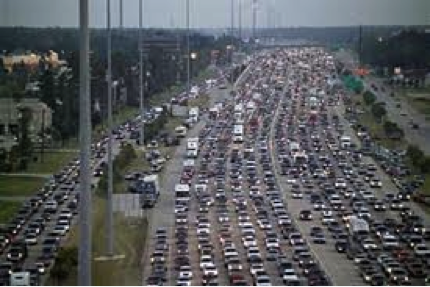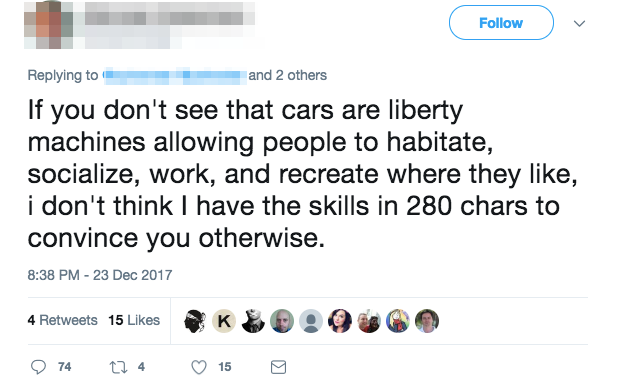Physical Address
304 North Cardinal St.
Dorchester Center, MA 02124
Physical Address
304 North Cardinal St.
Dorchester Center, MA 02124

During an urbanist twitter free-for-all last week, the thoroughly awesome term “liberty machines” was used to describe the virtues of the car. The claim was made that cars let individuals go wherever they want, whenever they want and are therefore a ‘freedom enhancing’ form of transit.

This isn’t the first time I’ve heard this argument in libertarian(ish) circles. But it doesn’t tally with my experience and I’m not sure it makes any sense even within its own premise.
A Personal Anecdote and a Couple Thoughts
When I learned to drive way back when, it was in the great state of Texas where driving is basically a necessity. In that context, getting my license (and being economically fortunate enough to have access to a car) was certainly liberating for me after a fashion.
Thinking back, though, I enjoyed far less mobility as a car bound teenager in suburban Houston than I do now living in Oakland, California. I walk to the grocery, take BART to work, bike to the gym, catch a Lyft to go out, and/or drive myself when the occasion demands. Most of my trips are multimodal and the integration of transit modes affords me far more freedom of movement than car use alone ever could.
The biggest reason for this is that single occupancy vehicle use doesn’t scale as a stand alone system. Unpriced roadways are prone to hitting congestion points and, as readers of this blog are probably aware, adding lanes doesn’t help. When roads become clogged, and there are no viable alternatives, a reliance on cars becomes a constraint. And to respond to the idea that mass transit relies on government subsidies and car use does not…the technical term for that would be factually incorrect. Mass transit is more than capable of paying for itself and let’s just say highways don’t exist in the state of nature.

Returning to this idea of ‘freedom enhancing’ transit, a reliance on cars has got to be the worst of all options. Besides the congestion problems, there are distributional impacts as well. If you’re too young or too old to drive, you’re reliant on those who still can. Not to mention the fixed overhead of car ownership is a regressive burden on the least well off.
So…is there a case for the car as the pro-liberty choice in transit? Not as far as I can see. And while #libertymachines is an incredibly tweetable hashtag, it’ll have to remain ironic for now.
Get outside of those congested urban areas, and its rather easy to experience the freedom of automobiles, to open up the rest of the USA for discovery.
Get out of those places where 70% of people live and it’s easy to experience the freedom to go to all the places without any businesses or friends.
Rather dismissive POV. Remember that the bulk of your 70% of people actually live in suburbs, where autos fit in nicely. Think a bit deeper, while you e njoy your bus ride.
Cars are to freedom as kidnappers are to the kidnapped, minus the whole voluntary/involuntary part. When we build our suburban and urban environments around the car we create a dependency on that car. When a person is kidnapped they are dependent on the kidnapper. Their only freedom is provided by the very thing that took it away in the first place. Same with cars. Without cars in low density locations there is little freedom. But go to a nice dense location and as the author pointed out options exist and I agree that that is where freedom lies. I for one do not enjoy being a slave to my car and that is why I prefer dense urban environments.
Not to mention the pretexts for searches of person and property that are available to the police when one is in a car, that are not available when one is on foot or in public transit.